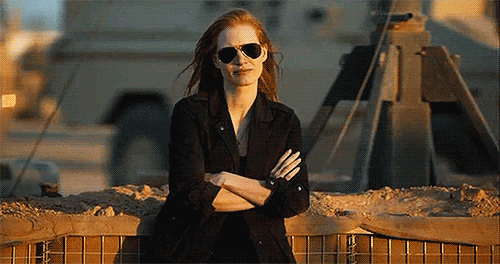The war-time, high-octane violence in Kathryn Bigelow’s newest film “Zero-Dark Thirty” is kept to a minimum. In it’s place are the meticulous applications of torture in a modern world and the obsessive, technological age of the military intelligence complex. “More West Wing than Black Hawk Down,” said another audience member a few seats over. Almost with a tone of disappointment.
“Zero-Dark Thirty” places audience members in the globe-trekking hunt by “straight-out of highschool” intelligence agent Maya (Jessica Chastain). The film follows Maya’s progression from newbie torture assistant to the lead--oftentimes lone--crusader in the manhunt for UBL, or as most know him, Osama Bin Laden.
Bigelow guides the audience through a tour of psychological trauma and tension by giving a retelling of every major terrorist attack on the ‘Western World’ since September 11, 2001. Viewers are allowed to linger in the dark for a minute, only hearing phone calls and transmissions of the people edified into public history as some of this country’s most innocent victims--then mixes real-news footage with cinematic recreation that leads to an unsettling review of the past decade of global politics.
All of this is through the ever-aging, ever-tiring, ever-obsessed eyes of Maya, whom the camera rarely leaves. It isn’t hard to draw comparisons from her transformation and the audience which had been hurt, confused, then whipped into a frenzy over two land wars. Maya voluntarily witnesses almost every form of torture used in modern-day interrogation within first 20 minutes of the film, graphically--though it only serves to steel her resolve.
That isn’t to say Bigelow was attempting a rail against torture, or it’s effectiveness. In an article for the New Yorker, screenplay writer Mark Boal and Bigelow simply stated “it’s a movie, not a documentary” and “the film doesn’t have an agenda, it doesn’t judge.”
While eschewing a stance on torture might be necessary for a film that depicts the hunt for one of the U.S’s greatest villians, the theme of the country’s addiction to war has carried from “The Hurt Locker,” shown by Maya’s progressively more embedded appearance and vigor; the willingness and determination to “finish the job.”
Thematically, it was also awkwardly affirmed by the guys in the back row that whispered “oh fuck yes” whenever one of the Navy SEALS fondled a high-tech murder-gadget or shot someone in the face.
 |
| Or maybe I am missing the point and America is just full of bad-ass mother-fuckers like Jessica Chantai. |



I liked your use of quotes throughout the review. I think you were able to use them well and it wasn't "clunky" when you did so.
ReplyDeleteAs far as the tone, I wonder if you could've been a little more even-handed. Every paragraph reads as if you were disappointed in the film. Why don't you say what the film did well, then come out and say what you didn't like? For example, the second quote compares "Zero Dark Thirty" to two award winners then says the speaker was disappointed.
You described everything well. Each descriptive sentence gave me a clear picture of the movie. I just can't tell if you were trying to be subtle, or you just didn't want your dissatisfaction to show.
Maybe it deserves a follow up? Becuase I feel that the review summed up the vibe I got from the film, mayhaps playing critic to what the film was trying to convey.
DeleteI did stray away from "I liked it, you should see it," "I didn't like it you shouldn't see it," or any combination of the two--though I didn't mean to express dissatisfaction (though I copped out with the title.)